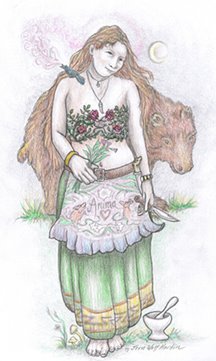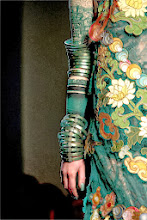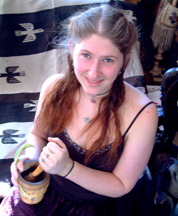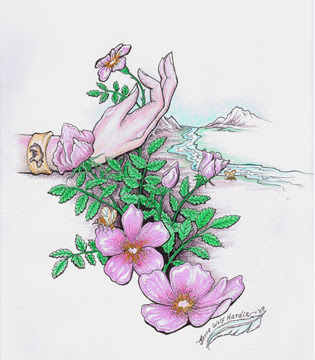 I’ve noticed a recent trend towards herbal exploration and re-discovery. Not completely content to defer to America’s most marketed herbs list, we’ve been digging through old books, sifting through the older people’s memories and tasting, testing and playing with every new plant we come across. This isn’t because we don’t already have wonderfully effective allies to work with, but because each bioregion has its own prolific plant communities that are readily available, free of charge and best of all, intimately connected to us through the air we breathe, the earth we grow from and the rain that quenches our thirst.
I’ve noticed a recent trend towards herbal exploration and re-discovery. Not completely content to defer to America’s most marketed herbs list, we’ve been digging through old books, sifting through the older people’s memories and tasting, testing and playing with every new plant we come across. This isn’t because we don’t already have wonderfully effective allies to work with, but because each bioregion has its own prolific plant communities that are readily available, free of charge and best of all, intimately connected to us through the air we breathe, the earth we grow from and the rain that quenches our thirst.
New herbs have been sifting back into common consciousness through the committed work of many herbalists, and Matt Wood was one of the first to really open my eyes to new ways of working with unusual and non-typical plants. His innovative use of plants like Teasel helped me to be brave enough to go outside and try a taste of various leafy friends who had been calling to me but I was afraid to experiment with (“surely if it was medicinal, it would be in all the plant books, right?”). Another great inspiration has been Jim McDonald’s excellent work with Purple Loosestrife, Calamus, Mullein and Aster.
So this year, as I continue to build on the knowledge of the foundation herbs I best know, I’m focusing on getting to know a few off-brand herbs, like Sweet Clover, Dragonhead, Fireweed, Alder, Speedwell and Wild Peony. I’m looking forward to expanding my knowledge about local Gila plants, and I’m especially excited to meet local tonic herbs. Expect to see posts on many of these new friends this growing season.
There’s a myriad of methods to get to know the plants better and I’ve listed some in my previous posts on intimacy and specific medicines. Here I want to mention a few ways to form an introduction to an unfamiliar plant.
1) Be open - listen when a new plant calls to you, even if you don’t recognize it or have previously heard/read it referred to as useless or insignificant.
2) Participate - Once you’ve identified the plant and know the plant is not toxic, taste it and record your impressions. I like to use an energetic basis and include hot or cold, dry or moist. I also note how the plant affects my pulse, state of mind, mood, etc. This is, of course, quite subjective, but repeated experiences will tend to give you an idea of the basics. The most important thing is to let yourself experience the energy of the plant and to participate in the specific dance of that herb. This is a great thing to do with plants you already know too!
3) Research - Don’t limit your herb reading to glossy covered books with the newest studies and constituent lists, remember to read the herbal classics by the likes of William Cook, Culpeper, Hildegard von Bingem and others. These books are oft ignored treasure troves, and many of these out of print books can be found of the web sites of Henriette Kress, Michael Moore and Paul Bergner. Purposely search out books containing information on less known plants, besides the old classics, good ethnobotanical texts and bioregional herbals are great sources of nearly forgotten knowledge.
4) Ask around - Ask the old people in your area what they know about local weeds, start up a conversation with anyone you see harvesting wild plants, you never know what gems and amazing stories they might hold. And don’t forget to ask your own family members, you might be surprised at the healing tidbits Great Aunt Mary has hidden up her sleeve ;)
5) Listen - Don’t just constantly regurgitate what you already know, open your ears around other plant people, even people you consider to be less experienced or knowledgeable then yourself. I’m learned amazing things about plants from children who just thought to try something spontaneously.
6) Share - Making your valuable experience available guarantees that the knowledge will be shared and hopefully help others as well as generate new experiences and information. A huge part of herbalism is still within the oral tradition and the only way to keep that from being lost is to share it with others.
It can be tempting to be discouraged by the seeming lack of information on a certain plant, and you may feel like sticking with more familiar herbs in order to remain in known, safe territory. It takes courage to experiment, experience and then put yourself on the line as possibly crazy when telling others about a strange new green friend. But persevere, and you’ll find a whole new world of exciting possibilities just beyond your back door!
Saturday, April 21, 2007
Re-Connecting with Forgotten Friends
Posted by
Oakmoss Changeling
at
6:56 PM
![]()
Labels: Medicine Woman Materia Medica
Subscribe to:
Post Comments (Atom)
The Medicine Woman is glad you came...
All writings & posts (c)2007 Kiva Rose
All artwork & photographs (c) 2007 Jesse Wolf Hardin












No comments:
Post a Comment